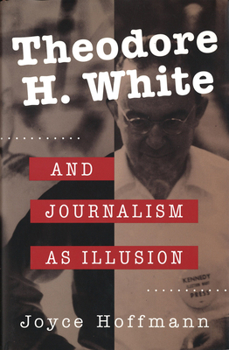Theodore H. White and Journalism as Illusion
Select Format
Select Condition 
Book Overview
In this groundbreaking study, Joyce Hoffmann examines a critical twenty-five-year period in the work of one of the most influential journalists of the twentieth century. Theodore H. White was already a celebrated reporter when Jacqueline Kennedy summoned him for an exclusive interview in the aftermath of her husband's assassination. With her help, White would preserve what the First Lady claimed had been John F. Kennedy's vision of the New Frontier...
Format:Hardcover
Language:English
ISBN:0826210104
ISBN13:9780826210104
Release Date:August 1995
Publisher:University of Missouri Press
Length:208 Pages
Weight:1.25 lbs.
Dimensions:0.8" x 6.3" x 9.6"
Age Range:18 to 10 years
Grade Range:Postsecondary to Grade 5
Customer Reviews
1 rating
Basically good, but some terms need better definition
Published by Thriftbooks.com User , 23 years ago
"Theodore H. White and Journalism as Illusion" is a fascinating in-depth study of the life and times of Theodore H. White. Using the vast resources of the T. H. White archives at Harvard University, Joyce Hoffmann sets up White as the prime example of what she feels was wrong with journalism in the early Cold War era. She alternately uses the phrases "journalism of illusion" and "insider journalism" to describe White's writings. "Journalism of illusion" refers to the writings of those who, like White, were American patriots first and journalists second. The best examples Hoffmann has of White as a "journalist of illusion" come from the early part of White's career when he was in China, writing about Chiang Kai-shek for Time magazine. White would routinely downplay his observations of Chiang's corruption and brutality, believing it was more important to portray Chiang as a hero, lest America's support for China should wane and China would fall to the Japanese or the communists. It was only after repeated exposure to the Chiang regime's brutality that White's illusions about Chiang began to change. By that time, however, the heroic image he and other journalists had created had already taken hold in America, and White found himself under extreme pressure to follow the line. Editors at Time censored his work, feeling that the change in White's opinion was due to his encounters with the Chinese communists. "Journalism of illusion" meant being an American patriot first, and telling the truth second. It also meant following the teachings of Time's Henry Luce, who believed in "enlightened journalism", and told White to report events not as they were, but as they should be. Hoffmann's critique of White as an "insider journalist" comes from various periods of White's life, but the best examples are from his time in France, and from the Kennedy years. White was a journalist who loved associating with those in power, which Hoffmann associates to White's upbringing in Boston's poor Jewish ghetto. Never surrounded by prosperity as a child, White seemed to gravitate toward the prosperous as an adult. Hoffmann believes that White's admiration for the rich and powerful, and his desire to be one, seriously colored his writings. White repeated engaged in journalistic practices that would be considered inappropriate by today's standards of integrity. In France, for example, White was commissioned to write a profile of diplomat David Bruce. When White was finished, he showed a copy of the write-up to Bruce, presumably for fact-checking purposes, but also to make sure that nothing White wrote would be considered insulting to Bruce or his wife. White would follow the same practice in his write-ups of the Kennedy administration. Most famously, he showed Bobby Kennedy copies of "Making of the President -- 1960" before its publication in order to get Kennedy's feedback. As an insider journalist, White loved having the ear of those in powe






